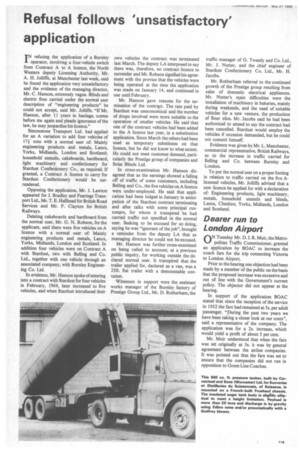Refusal follows 'unsatisfactory' application
Page 84

If you've noticed an error in this article please click here to report it so we can fix it.
'Orefusing the application of a Burnley perator, involving a four-vehicle switch from Contract A to A licence, the North Western deputy Licensing Authority, Mr. A. H. JoIliffe, at Manchester last week, said he found the application very unsatisfactory and the evidence of the managing director, Mr. C. Hanson, extremely vague. Blinds and electric fires carried under the normal user description of "engineering products" he could not accept, said Mr. JoIliffe. "If Mr. Hanson, after 11 years in haulage, comes before me again and pleads ignorance of the law, he may jeopardise his licence."
Simonstone Transport Ltd. had applied for an A variation to add four vehicles of 17+ tons with a normal user of: Mainly engineering products and metals, Lanes, Yorks, Midlands, London and Scotland; household utensils, cakeboards, hardboard, light machinery and confectionery for Stardust Confectionery Co., as required. If granted, a Contract A licence to carry for Stardust Confectionery would be surrendered.
Opposing the application, Mr. J. Lawton appeared for J. Bradley and Fearings Transport Ltd., Mr. T. E. Hallhead for British Road Services and Mr. F. Clayton for British Railways.
Deleting cakeboards and hardboard from the normal user, Mr. G. N. Robson, for the applicant, said there were five vehicles on A licence with a normal user of: Mainly engineering products and metals, Lanes, Yorks, Midlands, London and Scotland. In addition four vehicles were on Contract A with Stardust, two with Belling and Co. Ltd., together with one vehicle through an associated company, with Burnley Engineering Co. Ltd.
In evidence, Mr. Hanson spoke of entering into a contract with Stardust for four vehicles in February, 1964, later increased to five vehicles, and when Stardust introduced their own vehicles the contract was terminated last March. The deputy LA interposed to say there was, therefore, no contract licence to surrender and Mr. Robson signified his agreement with the proviso that the vehicles were being operated at the time the application was made on January 14, and continued in use until February.
Mr. Hanson gave reasons for the termination of the contract. The rate paid by Stardust was uneconomical and the number of drops involved were more suitable to the operation of smaller vehicles. He said that one of the contract vehicles had been added to the A licence last year, in a substitution application. Since March the others had been used as temporarysubstitutes on that licence, but he did not know to what extent. He could not meet customer demand, particularly the Prestige group of companies and Solar Blinds Ltd.
In cross-examination Mr. Hanson disagreed that as the earnings showed a falling off of traffic of some customers, including Belling and Co., the five vehicles on A licence were under-employed. He said that application had been lodged in January in anticipation of the Stardust contract terminating and after talks with some principal customers, for whom it transpired he had carried traffic not specified in the normal user. Seeking to be excused for so doing, saying he was "ignorant of the job", brought a reminder from the deputy LA that as managing director he could not be excused.
Mr. Hanson was further cross-examined on being called to account, at a previous public inquiry, for working outside the declared normal user. It transpired that the trailer applied for, declared as a van, was a 25ft. flat trailer with a demountable container.
Witnesses in support were the assistant works manager of the Burnley factory of Prestige Group Ltd., Mr. D. Rotherham, the traffic manager of G. Tweedy and Co. Ltd., Mr. J. Nutter, and the chief engineer of Stardust Confectionery Co. Ltd., Mr. H. Jacobs.
Mr. Rotherham referred to the continued growth of the Prestige group resulting from sales of domestic electrical appliances. Mr. Nutter's main difficulties were the installation of machinery in bakeries, mainly during weekends, and the need of suitable vehicles for a new venture, the production of flour silos. Mr. Jacobs said he had been authorized to attend to say the contract had been cancelled. Stardust would employ the vehicles if occasion demanded, but he could not commit himself.
Evidence was given by Mr. L. Manchester. commercial representative, British Railways. as to the increase in traffic carried for Belling and Co. between Burnley and London.
To put the normal user on a proper footing in relation to traffic carried on the five Alicensed vehicles, Mr. Jolliffe advised that a new licence be applied for with a declaration of: Engineering products, light machinery, metals, household utensils and blinds, Lanes, Cheshire, Yorks, Midlands. London and Scotland.
Dearer run to London Airport
ON Tuesday Mr. D. I. R. Muir, the Metropolitan Traffic Commissioner, granted an application by BOAC to increase the coach fare for the trip connecting Victoria to London Airport.
Prior to the hearing one objection had been made by a member Of the public on the basis that the proposed increase was excessive and out of line with the Government's current policy. The objector did not appear at the hearing.
In support of the application BOAC stated that since the inception of the service in 1952 the fare had remained at 5s. per adult passenger. "During the past two years we have been taking a closer look at our costs", said a representative of the company. The application was for a 2s. increase, which would yield a profit of about 5 per cent.
Mr. Muir understood that when the fare was set originally at 5s. it was by general agreement between the airline companies. It was pointed out that the fare was set to ensure that the companies did not run in opposition to Green Line Coaches.




































































































































































































































































